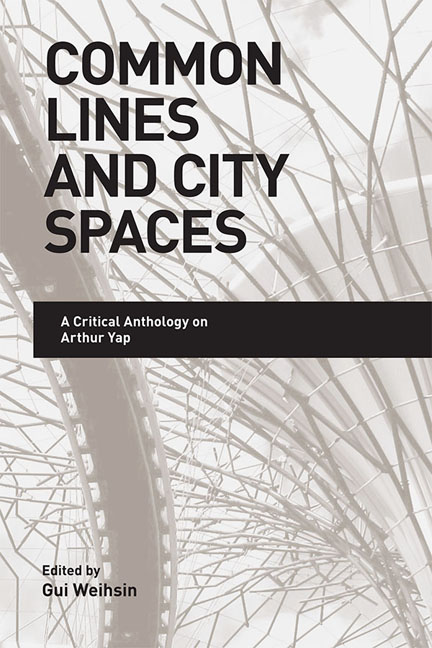Book contents
- Frontmatter
- Contents
- Acknowledgements
- About the Contributors
- 1 Common Lines and City Spaces: Introduction
- 2 The Transformation of Objects into Things in Arthur Yap's Poetry
- 3 “the same tableau, intrinsically still”: Arthur Yap, Poet-Painter
- 4 “go to bedok, you bodoh”: Arthur Yap's Mapping of Singaporean Space
- 5 On Places and Spaces: The Possibilities of Teaching Arthur Yap
- 6 Arthur Yap's Ecological Poetics of the Daily
- 7 “except for a word”: Arthur Yap's Unspoken Homoeroticism
- 8 “a long way from what?”: Folkways and Social Commentary in Arthur Yap's Short Stories
- Index
- Plate section
8 - “a long way from what?”: Folkways and Social Commentary in Arthur Yap's Short Stories
Published online by Cambridge University Press: 19 May 2017
- Frontmatter
- Contents
- Acknowledgements
- About the Contributors
- 1 Common Lines and City Spaces: Introduction
- 2 The Transformation of Objects into Things in Arthur Yap's Poetry
- 3 “the same tableau, intrinsically still”: Arthur Yap, Poet-Painter
- 4 “go to bedok, you bodoh”: Arthur Yap's Mapping of Singaporean Space
- 5 On Places and Spaces: The Possibilities of Teaching Arthur Yap
- 6 Arthur Yap's Ecological Poetics of the Daily
- 7 “except for a word”: Arthur Yap's Unspoken Homoeroticism
- 8 “a long way from what?”: Folkways and Social Commentary in Arthur Yap's Short Stories
- Index
- Plate section
Summary
INTRODUCTION: THE EARLY STORIES (1962–64)
In this chapter we analyse Arthur Yap's short stories in two distinct segments: his early prose fiction written and published between 1962 and 1964, and his later stories from the period 1969–82. At first glance Yap's stories may appear slight, even undynamic. However, as careful readings of his sparse, understated poetry and visual art reveal, in Yap's works things are rarely as they initially appear. Through close readings of his short stories — so short we suspect almost every word takes on the metaphorical pressure per square inch we might expect in a poem — we demonstrate how these works repay closer scrutiny and merit a more prominent place in Yap's collected works. In many of his poems performative wordplay is overt; while in his short, often sparse, poems there is little room to subtly embed such performances, Yap's comparatively longer prose fiction provides scope for significantly more subtle and ambiguous linguistic performances. Beneath their quotidian surface, Yap's beguiling short stories are as rich and as enigmatic as his poems.
Yap's poetry is more representational than his painting and his stories appear at first glance even more representational than his poetry. On a cursory reading there appears to be little of the explicit absence of conventional grammar or overt linguistic exhibitionism we encounter in his poems. Yet those same spare, crafted poems engaging with the everyday may prepare readers to be wary of what might initially appear to be a slight, “commonplace” quality to the stories, where little seems to happen. The near absence of event draws Yap's readers’ attention to other elements: specifically a subtly knowing deployment of language (notably in grammatical trickery and the use of telling vocabulary and phrases) contributing to the stories’ ambiguous and, with successive readings, increasingly perplexing nature. As we demonstrate, Yap's stories benefit from wary, active, linguistically and historically sensitive readings. Yap is already recognized as a poet whose voice tentatively locates, satirizes, and subverts an emerging sense of Singaporean nationhood. We explore how the aesthetic and ideological trajectories of Yap's prose in many ways resemble those encountered in his poetry. While providing an initial overview and exploration of Yap's short stories, the essay initiates critical discussion of a neglected facet of his opus, hopefully prompting further exploration of these stories and their place in both Yap's and the wider Singaporean canon.
- Type
- Chapter
- Information
- Common Lines and City SpacesA Critical Anthology on Arthur Yap, pp. 151 - 190Publisher: ISEAS–Yusof Ishak InstitutePrint publication year: 2014

